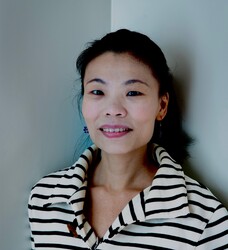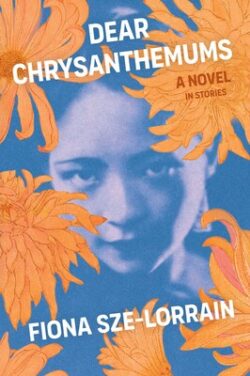 Fiona Sze-Lorrain is a writer, poet, translator, musician, and editor. She writes and translates in English, French, Chinese, and occasionally Spanish. She also works with Italian and Japanese. Her work includes a novel in stories, Dear Chrysanthemums (Scribner, 2023), five poetry collections, most recently Rain in Plural (Princeton, 2020) and The Ruined Elegance (Princeton, 2016), fifteen books of translation, and three coedited anthologies of international literature. A finalist for the Los Angeles Times Book Prize, the Best Translated Book Award, and the Derek Walcott Poetry Prize among other honors, she is longlisted for the 2024 Andrew Carnegie Medal for Excellence in Fiction. A 2019–20 Abigail R. Cohen Fellow at the Columbia Institute for Ideas and Imagination and the inaugural writer-in-residence at the Museo de Arte Latinoamericano de Buenos Aires, she lives in Paris where she serves as an editor at Vif Éditions. As a zheng harpist, she has performed widely in Europe, Asia, and the U.S. She is also involved in mediation, arbitration, and negotiation. (Bio from the Society of Authors, UK)
Fiona Sze-Lorrain is a writer, poet, translator, musician, and editor. She writes and translates in English, French, Chinese, and occasionally Spanish. She also works with Italian and Japanese. Her work includes a novel in stories, Dear Chrysanthemums (Scribner, 2023), five poetry collections, most recently Rain in Plural (Princeton, 2020) and The Ruined Elegance (Princeton, 2016), fifteen books of translation, and three coedited anthologies of international literature. A finalist for the Los Angeles Times Book Prize, the Best Translated Book Award, and the Derek Walcott Poetry Prize among other honors, she is longlisted for the 2024 Andrew Carnegie Medal for Excellence in Fiction. A 2019–20 Abigail R. Cohen Fellow at the Columbia Institute for Ideas and Imagination and the inaugural writer-in-residence at the Museo de Arte Latinoamericano de Buenos Aires, she lives in Paris where she serves as an editor at Vif Éditions. As a zheng harpist, she has performed widely in Europe, Asia, and the U.S. She is also involved in mediation, arbitration, and negotiation. (Bio from the Society of Authors, UK)
We're delighted that Fiona will be joining us in February to discuss her book Dear Chrysanthemums (see our Event page), and that we're able to feature an extract for our bookclub here.

 A startling and vivid debut novel in stories from acclaimed poet and translator Fiona Sze-Lorrain featuring deeply compelling Asian women who reckon with the past, violence, and exile—set in Shanghai, Beijing, Singapore, Paris, and New York.
A startling and vivid debut novel in stories from acclaimed poet and translator Fiona Sze-Lorrain featuring deeply compelling Asian women who reckon with the past, violence, and exile—set in Shanghai, Beijing, Singapore, Paris, and New York.